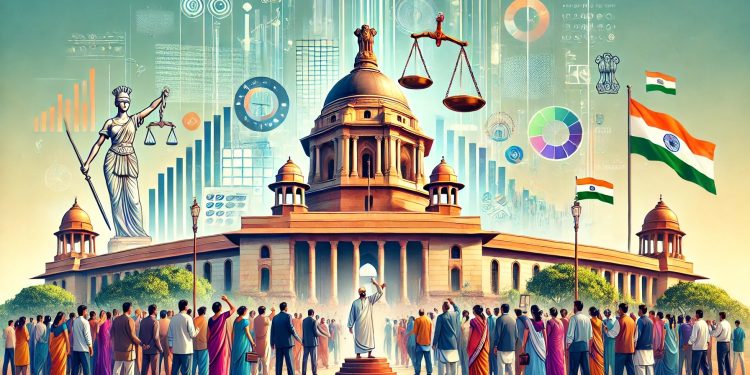Former Delhi Chief Minister Arvind Kejriwal rose to power championing anticorruption in Indian politics. But last March, India’s Enforcement Directorate (ED), a semi-independent agency tasked with enforcing anticorruption laws, arrested Kejriwal in connection with allegations that his Aam Aadmi Party (AAP) received over $10 million in kickbacks in exchange for favorable liquor licenses in Delhi. This is not the first time that the AAP—a self-described anticorruption party—has been implicated in a corruption scandal (see here and here). Perhaps Kejriwal is yet another example of a politician caught betraying in private the principles he’d championed in public.
But several observers have raised concerns about Kejriwal’s arrest, and suggested that it may reflect a disturbing politicization of anticorruption enforcement under Prime Minister Narendra Modi. For one thing, critics point to the suspicious timing of the arrest: Kejriwal was arrested just weeks before India’s national elections, following two years of investigation with no prior action. And Kejriwal’s arrest may have distracted public attention from a potential corruption scandal that would affect Modi’s party, the BJP, involving BJP fundraising from anonymous corporate donations through a system that the Indian Supreme Court recently declared unconstitutional. More generally, Kejriwal’s arrest fit a troubling pattern: Since 2014, 95% of the ED’s cases are against politicians from minority parties (under the previous regime, the number was 54%). Even more disturbing, 23 of the last 25 politicians probed for corruption saw charges dropped after switching allegiances to the BJP. And just a month prior to Kejriwal’s arrest, Hemant Soren, another popular Chief Minister critical of the BJP, was arrested on corruption charges.
So, is this a case where a hypocritical politician is being held accountable for betraying his own principles? Or is this an instance in which anticorruption enforcement has been weaponized by the incumbent president to discredit and punish political adversaries? Or both? How are citizens to know? Uncovering the truth is especially difficult when the three pillars meant to ensure transparency and accountability in Indian anticorruption efforts—the judiciary, the media, and civic organizations—appear increasingly susceptible to political and systemic pressures. When these institutions fail to inspire public confidence, the boundary between legitimate accountability and political retribution is obscured. Kejriwal’s case highlights the need to examine the state of these pillars and their ability to fulfill their critical roles in such contentious cases.
Consider first the Indian judiciary. At its best, the judiciary can function as a “truth commission,” helping to provide clarity to complex situations and conflicting allegations. However, concerns about judicial independence have grown steadily more serious (see, for example, here, here, here, and here) with cases against opposition leaders often leading to swift action and severe penalties, while cases filed against the BJP frequently languish or are dismissed. For anticorruption efforts to maintain legitimacy, the judiciary must reclaim its position as a credible and independent arbiter—one capable of committing to its truth-seeking function precisely when the public needs it most. Failure to do so will deepen public mistrust, leaving corruption cases mired in suspicion and vulnerable to manipulation by political actors themselves.
The media also plays a critical role in shaping public perceptions of justice, particularly in high-profile corruption cases (see here and here). Yet the autonomy of Indian media outlets appears increasingly compromised. Critics claim that most mainstream media outlets are under the control of individuals or entities linked to the ruling party, which has led to allegations that opposition scandals receive outsized coverage while TV news anchors toe the government line. However, others note that partisan biases run both ways, with some “liberal” media platforms favoring their political allies or sensationalizing stories to advance agendas. Investigative journalism, meanwhile, has been under “enormous pressure,” as dissenting voices are increasingly seen as being suppressed through lawsuits, raids, or arrests. Without reliable media reporting, citizens are left to sift through competing partisan narratives.
Civic organizations have historically have served as the backbone of public accountability in India, and these groups have been instrumental in exposing corruption and mobilizing citizens against systemic abuse (see here, here, and here). Yet today, their ability to function as independent watchdogs is waning. Stringent regulations like the Foreign Contribution (Regulation) Act can block NGOs from accessing foreign funds if they act against “the public interest,” a term some activists equate with being critical of the government. Others report harassment through arbitrary audits, legal challenges, and accusations of undermining “national integrity.” These measures foster a climate of fear, deterring organizations from addressing politically sensitive cases or challenging entrenched power structures. And this, in turn, makes it harder for these organizations to effectively expose instances of corruption, and instances where anticorruption enforcement is being wielded as a political weapon.
Without the help of independent and credible judiciary, media, and civic organizations in establishing some semblance of truth, citizens will not have a reliable mechanism to discern whether anticorruption efforts are genuinely about accountability or merely tools for political entrenchment. An election thereby becomes less about the people’s needs and more about which leader can wield the rhetorical sword of corruption more effectively. Perhaps the greatest tragedy in the case of Kejriwal is that the question will no longer be whether he is guilty or innocent. It will be the inability of India’s democracy to distinguish between the two.











